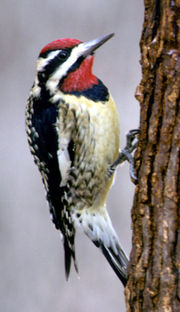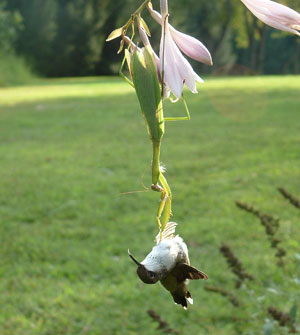|
The Ruby-throated Hummingbird is not a very social bird, however, it interacts with a number of different species. It is involved in three main types of relationships with other organisms in its niche:
1)
Mutualism
- a
relationship between two organisms where both benefit
Ruby-throats & Flowering Plants
Ruby-throats depend on the nectar from flowering plants
for most of their daily nutrients. Flowering plants in turn get pollinated every time the
birds feed on them and move to another plant. The Ruby-throat alone pollinates 31
plant species!
2)
Commensalism
- a relationship between two organisms where one benefits and the other is neither helped nor harmed
Ruby-throats & Yellow-bellied Sapsuckers
In times when nectar-producing plants are not as abundant, these hummingbirds eat sap out of holes in trees that were made by Yellow-bellied Sapsuckers. Ruby-throats that migrate into Canada probably wouldn't be able to survive without being able to feed from these holes. Some experts
even think that they time their springtime arrival so that they arrive during peak sapsucker activity.
3)
Competition
- a relationship between two organisms where they compete with each other for
things such as water, food, and mates
Ruby-throat vs. Ruby throat
Ruby-throats are constantly competing against each other
for flower nectar. They will often claim a territory and defend "their" flowers against other hummingbirds.

Despite their quick flying ability, they still manage to be
preyed on by a few
animals,
though none of them
depend on the Ruby-throat as a primary food source.
Some of the hummingbird's predators include hawks,
blue jays, house cats, crows, fish, dragonflies
and praying mantises.
|

